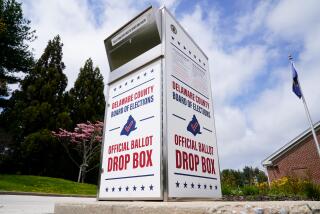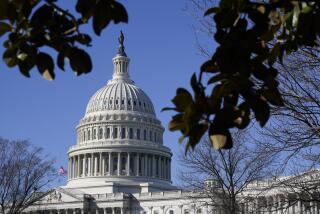Advertising Early and Often Shows Little Effect on Race
- Share via
WASHINGTON — President Bush and his Democratic foes have spent more than $48 million on television commercials since early March, a new independent estimate shows, but the unusually early advertising blitz doesn’t appear to have shifted the dynamics of the race in targeted states.
Data compiled for The Times by an independent ad monitor show that Bush has spent more than $26.6 million on broadcast and cable TV ads since the general election campaign kicked into gear. The conservative estimate was based on ads observed from March 4 through Saturday in major broadcast markets and on selected cable channels.
During that time, Democratic presidential candidate Sen. John F. Kerry of Massachusetts spent an estimated $6.1 million to run TV commercials in the targeted states, according to the monitor, TNSMI/Campaign Media Analysis Group of Virginia. Two anti-Bush groups, the Media Fund and MoveOn.org, helped the Democrats remain competitive with Bush by spending about $11.7 million and $4.3 million, respectively.
Most of the ads were beamed into 17 states that both parties call pivotal to the November election.
The TV campaign trail winds from the Pacific Northwest (Washington and Oregon) to the desert Southwest (New Mexico, Arizona and Nevada). It runs up the Mississippi River (Arkansas, Missouri, Iowa and Minnesota) and hopscotches eastward through Wisconsin, Michigan, Ohio, West Virginia and Pennsylvania. It also touches New Hampshire, Maine and, of course, Florida, scene of the 2000 electoral standoff.
Democratic-leaning California is not among the most hotly contested states.
Never before have candidates and groups spent so much money on TV so long before a presidential election. This year’s balloting is still nearly seven months away. For weeks, Bush has used ads to criticize Kerry as “troubling” on defense and the economy, citing his Senate votes against funding for the Iraq war and against various GOP-sponsored tax cuts. The ads were something of a risk for the president, plunging him deep into the campaign at a time of year when most incumbent presidents sought to remain above the fray.
Kerry and the anti-Bush groups have struck back with ads attacking Bush’s stewardship of the economy and faulting his vision on Iraq. MoveOn questioned Bush’s leadership in the battle against terrorism, attempting to undercut a pillar of his reelection effort.
Republicans allege that Kerry and the anti-Bush groups are illegally coordinating their activities -- a charge the Democrat and the two groups deny.
For all the intensity of the air war, the effect of the ads in battleground media markets from Portland, Ore., to Portland, Maine, appears muted at best.
A Gallup/USA Today poll in late March suggested that Bush’s ads were having some success in sowing doubts about Kerry. But subsequent polls by the University of Pennsylvania’s National Annenberg Election Survey and the Pew Research Center for the People and the Press found that opinions about Kerry and Bush have hardly budged during the ad blitz. In addition, several new surveys point to a statistical tie between the two candidates nationwide.
“At this point, I don’t have any compelling evidence that the advertising in those swing states is having a material impact,” said Andrew Kohut, director of the Pew Center.
Adam Clymer, political director for the Annenberg survey, said the public might not be tuning in to the race yet, with Kerry still more than three months away from becoming his party’s formal nominee at the Democratic National Convention in Boston. The Republican National Convention begins at the end of August in New York.
But Clymer said the early ads were not necessarily a waste of money. “You don’t know how long it will take to have an impact. They may be fighting to a draw, or it may take several months for a message to sink in.”
The ad war is likely to intensify significantly after Labor Day.
So far, Bush has spent only a fraction of the more than $158 million he raised through February for his reelection effort. With the two anti-Bush groups running major parallel ad campaigns, Kerry has sought to conserve his resources and focused on raising more money since he clinched the Democratic nomination March 2. His campaign has announced that Kerry raised more than $50 million in the first three months of the year, including $38 million in March.
More to Read
Get the L.A. Times Politics newsletter
Deeply reported insights into legislation, politics and policy from Sacramento, Washington and beyond. In your inbox twice per week.
You may occasionally receive promotional content from the Los Angeles Times.










